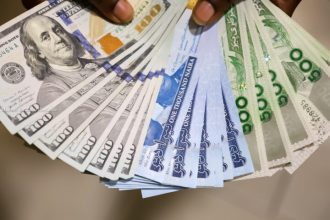You awaken to the morning light filtering through your window. As you brew your morning coffee, your mind turns to the day’s tasks ahead. Checking your finances sits at the top of your list. Navigating the global marketplace means keeping a pulse on currency exchange rates. For you, and business owners everywhere, those numbers influence bottom lines and dictate purchasing power.
Today, we turn our focus to Nigeria and the exchange rate between the Naira and U.S. dollar. On the black market, a realistic gauge of currency value, the Naira currently buys at N1,200 to $1 USD and sells at N1,250 to $1 USD. Compare this to just a year ago, when the spread between buy and sell rates stood much wider. The tightening gap signals the Naira’s resilience against economic shifts worldwide.
For individuals, exchange rates directly impact the cost of imports, from vacations to gadgets. For businesses dealing across borders, profitability hangs on these numbers. While storms rage in the global economy, the Naira stands its ground, continuing its dance in the bustling marketplace.
Current Naira to Dollar Exchange Rate
The Nigerian Naira and U.S. Dollar exchange rate is an important economic indicator for businesses and individuals in Nigeria. According to the black market exchange rate, the current buying rate for 1 USD is N1,200, while the selling rate is N1,250. Compared to the previous year, the gap between the buying and selling rates has narrowed significantly, indicating the Naira’s resilience against fluctuations in the global economy.
Why The Exchange Rate Matters
For individuals, the exchange rate impacts the cost of foreign goods and services, from vacations to imported electronics. For businesses, especially those involved in international trade, the rate directly affects profitability and the bottom line. Staying up-to-date with currency movements in today’s global market is crucial for financial well-being and success.
A Look At Recent Trends
Over the past year, the Naira has held steady against the Dollar, even as other currencies have declined in value. This stability demonstrates the Federal Government’s efforts to prevent excessive volatility and inspire economic confidence. If the current trends continue, the Naira is likely to remain stable or even strengthen slightly relative to the Dollar, which is good news for Nigeria’s economy and trade relations.
In summary, the present exchange rate of N1,200 to $1 shows a currency that remains strong despite global economic turbulence. For individuals and businesses in Nigeria, monitoring the Naira-Dollar exchange rate will continue to be essential for financial security and prosperity. Overall, the stabilizing Naira points to a bright economic outlook for Nigeria.
Factors Influencing Fluctuations in the Naira-Dollar Rate
The exchange rate between the Nigerian Naira and the U.S. dollar is influenced by several macroeconomic factors. Three of the most significant factors are oil prices, foreign exchange reserves, and the balance of trade.
Oil Prices
Nigeria’s economy depends heavily on oil exports, which provide the majority of government revenue and foreign exchange earnings. When global oil prices rise, Nigeria’s oil exports increase in value, raising the supply of dollars and strengthening the Naira. Conversely, a drop in oil prices weakens the Naira as foreign exchange inflows decline.
Foreign Exchange Reserves
Nigeria’s central bank, the CBN, manages foreign exchange reserves to maintain the stability and value of the Naira. When reserves are high, the CBN can sell dollars to meet demand and support the Naira. However, lower reserves limit the CBN’s ability to intervene in the market, putting downward pressure on the Naira.
Balance of Trade
Nigeria’s balance of trade, which is the difference between exports and imports, also impacts the Naira-dollar rate. When Nigeria’s exports exceed imports, there is a trade surplus that provides dollars to the economy and strengthens the Naira. On the other hand, a trade deficit means more dollars are leaving the economy to pay for imports, weakening the Naira.
Monitoring these economic indicators can provide insight into what is driving the Naira’s fluctuations versus the dollar. While short-term volatility may occur, understanding the underlying factors that determine the relative strength and value of Nigeria’s currency over the long run is key. With prudent economic management and policy reforms, Nigeria can achieve exchange rate stability and strengthen the Naira.
Impact of Currency Movements on Individuals and Businesses
The Naira’s exchange rate with the U.S. dollar significantly impacts Nigerians and local businesses. For individuals, the rate determines the cost of imported goods and international travel. A weaker Naira means higher prices for foreign products and pricier vacations abroad. Meanwhile, a stronger Naira provides more purchasing power and lower costs.
Effects on Businesses
For companies that import raw materials or goods, a weaker Naira reduces profit margins due to higher costs. Exporters also earn less revenue as each dollar of sales generates fewer Naira. However, exporters may gain a competitive advantage from lower prices. Domestic producers that compete with imports benefit from a weaker Naira as foreign goods become more expensive, increasing local demand.
Conversely, a stronger Naira benefits importers and exporters. Importers access cheaper inputs and materials, improving profitability. Exporters generate greater revenue as each dollar of sales earns more Naira. However, exporters lose some price competitiveness, and domestic producers face stiffer competition from lower-cost imports.
In summary, the Naira’s exchange rate volatility significantly impacts consumers, importers, exporters, and domestic producers. Individuals and businesses must monitor rates regularly and account for currency risks in financial planning and business strategies. While a weaker or stronger Naira may benefit some, it poses challenges for others. Managing exchange rate exposure is key to stability in Nigeria’s economy. Read Similar Story













I am sending you 1π! Pi is a new digital currency developed by Stanford PhDs, with over 47 million members worldwide. To claim your Pi, follow this link https://minepi.com/daiv101 and use my username (daiv101) as your invitation code.
Pi is a new digital currency developed by Stanford PhDs, with over 47 million members worldwide.
I am sending you 1π!
To claim your Pi, follow this link
https://minepi.com/dreamtreats and
use my username (dreamtreats) as your invitation code
#Athene #Network #ATH #Pi #PiNetwok #OpenEx #OEX
Good news Athene Network launched offical P2P trading Wesbite
Now you buy Sell … Ath Gem Pi on this Trading Site
Register your account link 👇
https://play.google.com/store/apps/details?id=network.athene.app
Refferal code. 61b3fbe999